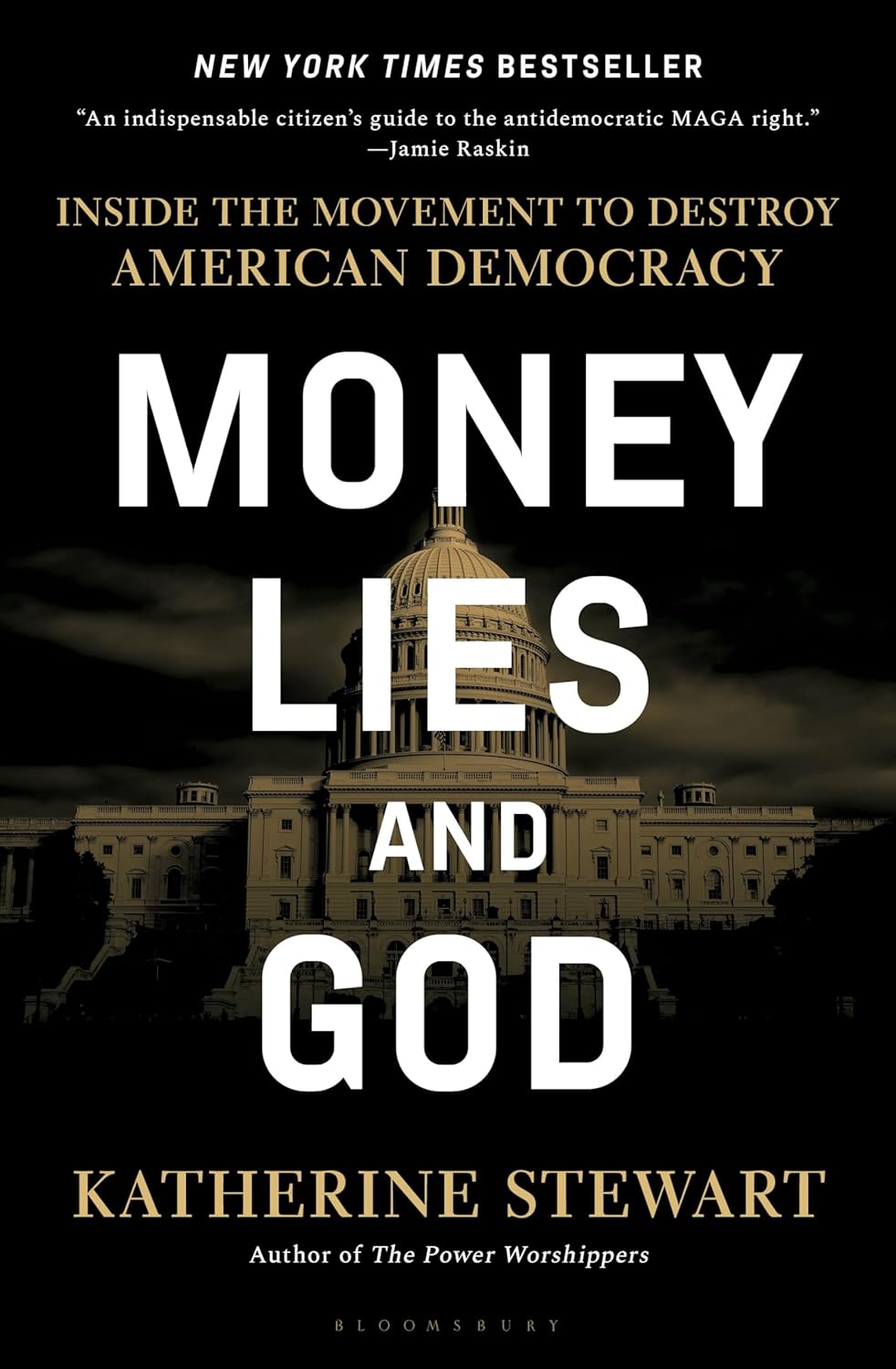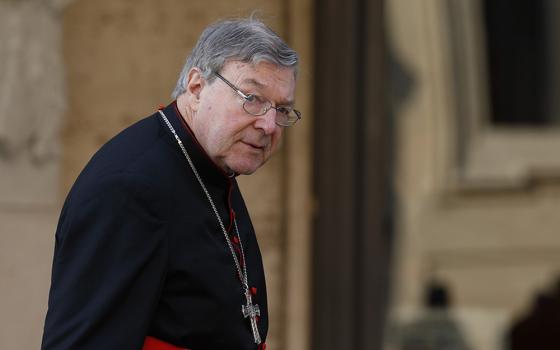U.S. Vice President JD Vance, right, reacts as President Donald Trump meets with Ukrainian President Volodymyr Zelenskyy at the White House in Washington Feb. 28. (OSV News/Reuters/Brian Snyder)
Maybe it was unwise to crack open Katherine Stewart's latest treatise, Money, Lies and God: Inside the Movement to Destroy American Democracy on the day of President Donald Trump's smackdown of Ukrainian President Volodymyr Zelenskyy. After watching accounts of the Feb. 28 foreign policy debacle, it was clear that American democracy was under a fierce assault that had taken hold more quickly than anyone predicted. We were witnessing its destruction in real time, with no real plan for fighting back.
Stewart enticed me with her promise to show with journalistic rigor "how an anti-Democratic movement took hold in America." Her theory was that the revolt of the right was not sudden at all, but deeply rooted in societal changes, including economic dislocation, dating back half a century.

An investigative journalist who once worked with the legendary Village Voice muckraker Wayne Barrett, she promised to "bring receipts" and described her reporting style as "look first and theorize later." Clearly, after devoting 15 years to her subject and producing two previous well-received books, Stewart has become an important voice on the evolution of right-wing, Christian nationalist, pro-fascist thinking.
But Stewart's latest volume suffers from incredibly bad timing. By its publication day, Trump had triumphantly returned to power, and her insights into the movement that enabled it no longer feel prescient. Trump's early moves toward authoritarian control — both globally and domestically — weakened the impact of Stewart's analysis, and her call to action came much too late. Money, Lies and God now joins a catalog of nonfiction that will offer little more than reference material for scholars trying to understand what Stewart dubs "the most serious threat to American democracy since the Civil War."
Stewart, who breaks down complicated ideas into soundbites, offers an organizational framework for the "diverse and complicated" antidemocratic movement. She divides it into the Funders, the Thinkers, the Sergeants, the Infantry and the Power Players. Understanding the intersections and tensions among these groups are key to understanding the current American crisis, she writes.
She then provides a compilation of virtually every investigative piece written about the right over the last 20 years by enterprising reporters at outlets that include the National Catholic Reporter and The New York Times. Her research is extensive, offering the insights of observers like NCR's Heidi Schlumpf and Tom Roberts on the evolving power dynamics of the Catholic Church.
Stewart's investigative reporting often feels like a polished retelling of discoveries made by others. She brings no new insights on wealthy reclusive Chicago funder Barre Seid, for example, or the Federalist Society's court influencer Leonard Leo. Her work on the ground brings no breathtaking surprises like author Isaac Arnsdorf provided on the MAGA movement's implementation of the "precinct strategy" promoted by talk show host Steve Bannon. Arnsdorf's book, Finish What We Started: The MAGA Movement’s Ground War on Democracy (which, as his former editor and friend and I had the chance to read before publication) sent a chill down the spine as the 2024 election season approached because so few journalists had taken the time to penetrate the MAGA grassroots.
Stewart infiltrates right-wing gatherings, picks up materials, interviews participants in hotel lobbies and offers well-turned descriptions of their appearances and provocative comments. But it feels like she is observing with distance and clear disapproval. It's difficult for a reporter from the left to penetrate right-wing events, and one wonders how Stewart gained trust or elicited honest feedback. Some of her excursions give her valuable insights. She witnesses the emergence of John Eastman, then dean of a small California law school, when she hears him speak at a World Conference on Families in Verona, Italy in 2019. Wisely, Stewart taped his mostly forgettable remarks. By 2023, Eastman surfaced as an alleged co-conspirator in Trump's aborted effort to reverse the results of the 2020 election.
Advertisement
Some of Stewart's most lively writing comes after she tires of U.S. right-wing politics and moves to England for family reasons. Stewart admits she was burned out after producing The Power Worshippers, a book about the Christian nationalist movement that inspired a documentary. "I felt lighter and more carefree. London was my escape," she writes.
On a Sunday morning, she wanders into a neighborhood Victorian church that turns out to be an outpost of the California-based evangelical megachurch GraceLife Community Church, which has just dispatched two new U.S. ministers to London. She befriends a naive parishioner, then steps back to explain the massive global expansion of Grace and other evangelical churches that are spreading the "politico-religious ambitions of reactionary religion."
As promised on her book jacket, Stewart follows the money in the U.K. to look at wealthy hedge fund manager Paul Marshall. Marshall is investing in an effort to place a Bible in every state school in the U.K. and to establish more conservative theological training. His influence shows up in the U.S. through his investment in tiny Ralston College of Savannah, Georgia, which spreads the word through its vigorous online presence. The school’s chancellor is culture warrior Jordan Peterson.
Stewart stops by a pub that night and chats with locals who float conspiracy theories exported from far-right corners of the U.S. Stewart realizes her London move will not offer "quite the kind of escape I had anticipated."
By the time Stewart offers her conclusion, she has dropped any pretense of journalistic objectivity. She offers a liberal to-do list that is wildly unattainable. To recapture control, she urges grand political reforms, like a reexamination of the Electoral College, an end to race-based gerrymandering and a rescue of the Supreme Court and federal judiciary. Not exactly easy goals in the current political climate.
She makes a passionate case that separation of church and state is a "good idea that should be tried." Tighten campaign finance laws to stop tax-exempt houses of worship from political involvement. Stop siphoning off public education money for religious schools. "Under the inaccurate name of 'religious liberty,' we are moving step by step toward a system in which government funnels money to religious groups, and those religious groups in turn deploy their spiritual hold over congregations to keep their favorite political party in power," she says.
Stewart's last bit of practical advice is to learn from the success of the right in building unexpected coalitions, investing in groups and candidates that support leftist ideals and building networks of local poll watchers, school board and town council candidates. It's similar to the strategy Bannon preached to rally Republican masses. "Put down this book and get to work now!" Stewart urges.
Again, Stewart seems to suffer from the unfortunate timing. It may already be too late.







